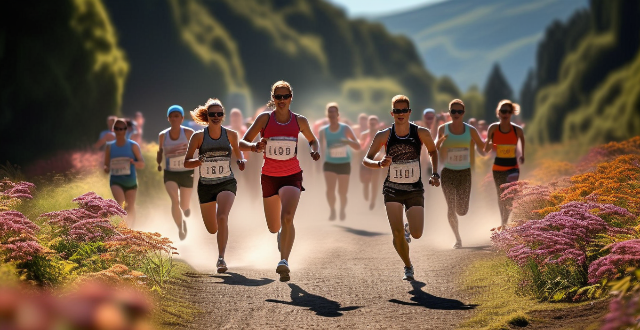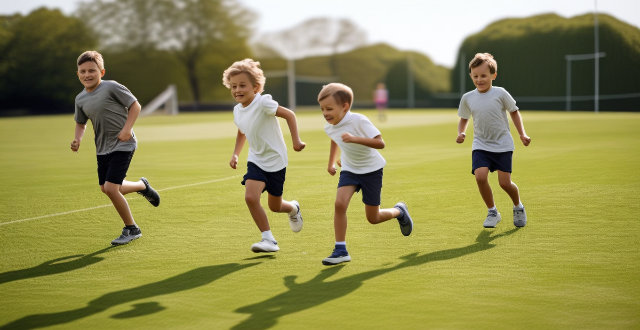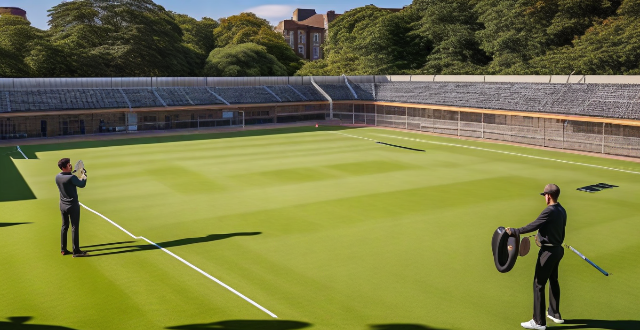Race Performance

How can I maintain proper pacing during a race or long run ?
Maintaining proper pacing is crucial for achieving your best performance in a race or long run. To do this, set a realistic goal time based on your training and past performances. Start the race at a slower pace than your goal pace to warm up your muscles and avoid starting too fast. Use a running watch or app to track your pace and distance during the race, and focus on your breathing to maintain a steady rhythm. Stay hydrated by drinking water or sports drinks regularly, and adjust your pace as needed if you feel like you're running too fast or too slow. Practice pacing in training so that it becomes second nature during races. By following these tips, you can achieve your best performance while listening to your body and adjusting your pace as needed.

What role does mental preparation play in improving running performance ?
Mental preparation is key to improving running performance. It involves setting clear goals, using visualization techniques, practicing mindfulness exercises, and employing self-talk strategies. By training the mind to focus on the task at hand, manage stress, and maintain motivation, runners can enhance their physical performance and achieve their running goals.

How do I prevent injuries during marathon training ?
Preventing injuries during marathon training is crucial for a successful and enjoyable race. To reduce the risk of injury, runners should warm up and cool down properly, gradually increase training intensity, incorporate cross-training, wear proper footwear, stay hydrated and well-nourished, schedule rest days, listen to their bodies, engage in strength training and flexibility work, and prepare for race day with pacing strategies and course familiarization. By following these guidelines, runners can minimize the chances of getting injured and maximize their potential for success on race day.

What types of data do sports performance tracking systems collect ?
Sports performance tracking systems collect a variety of data types, including physiological, biomechanical, technical, tactical, and psychological information. This data can help athletes and coaches analyze performance, identify areas for improvement, and make informed decisions about training and competition strategies. Other information such as environmental conditions, equipment used, and nutrition intake may also be collected to provide a comprehensive picture of an athlete's performance.

How does data analytics improve team performance in sports ?
Data analytics has transformed sports by providing teams with valuable insights into player performance, training programs, game strategy, and predicting outcomes. By leveraging advanced technologies and statistical methods, coaches and players can make more informed decisions that lead to improved performance on the field or court. Key benefits of data analytics in sports include identifying key performance indicators (KPIs), optimizing training programs, enhancing game strategy, evaluating player performance, and predicting outcomes. Overall, data analytics is a powerful tool for teams looking to gain an edge over their competitors and achieve success in their sport.

What role does visualization play in sports performance ?
Visualization is a powerful tool that can enhance sports performance by improving focus, confidence, technique, recovery, and motivation. It involves creating mental images of desired outcomes or actions, which can lead to better concentration, increased self-efficacy, enhanced motor learning, reduced risk of injuries, and higher levels of motivation. By incorporating visualization into their training routines, athletes can strengthen their physical and mental capabilities, resulting in improved performance during competition and training.

What benefits can individual athletes gain from tracking and analyzing their performance data ?
Individual athletes can gain numerous benefits from tracking and analyzing their performance data, including improved performance, increased motivation, greater self-awareness, better injury prevention, and more effective recovery strategies. By monitoring their progress, identifying areas for improvement, and making data-driven decisions about their training and competition strategies, athletes can enhance their overall performance and achieve better results.

What are the most common metrics used in analyzing sports performance ?
Analyzing sports performance is crucial for athletes, coaches, and teams to improve their skills, strategies, and overall performance. There are several metrics used to evaluate different aspects of sports performance, including time-based metrics such as speed and pace; distance-based metrics such as distance covered and displacement; power-based metrics such as peak power and power endurance; technique-based metrics such as form analysis and biomechanical analysis; physiological metrics such as heart rate and VO2 max; and mental metrics such as mental toughness and motivation levels. These metrics can help athletes and coaches identify areas for improvement and develop effective training programs to enhance performance.

What kind of training do I need to participate in a marathon or trail run ?
To participate in a marathon or trail run, it is essential to have a comprehensive training plan that focuses on endurance, strength, speed, and recovery. This includes gradually increasing the distance of long runs, incorporating tempo runs and hill repeats for endurance, core workouts and lower body exercises for strength, interval training and fartlek for speed, as well as prioritizing adequate sleep and nutrition for recovery. Mental preparation techniques like visualization and goal setting can also be beneficial. On race day, pacing strategies, equipment checks, and a detailed race plan are crucial for success.

What are some examples of successful sports charity events ?
Successful sports charity events like the Nike Foundation's "Girl Effect" Marathon, The Komen Race for the Cure, and The Wounded Warrior Project's Carry Forward 5K have raised millions of dollars for various causes by combining the excitement of sports with philanthropy. These events engage participants in physical activity, raise funds and awareness for important causes, and create a sense of community among participants and supporters.

What are the benefits of participating in adventure races ?
Adventure races offer numerous benefits including improved cardiovascular fitness, muscular strength, weight management, stress reduction, enhanced cognitive function, emotional well-being, adventure and fun, personal growth, community involvement, and more. These multi-discipline events challenge participants physically and mentally while promoting overall health and wellness. Whether seeking a thrilling experience, personal development, or simply enjoying nature, adventure races provide an excellent way to achieve these goals while having fun and creating lasting memories.

What impact does female leadership have on organizational culture and performance ?
The impact of female leadership on organizational culture and performance is significant. Women leaders prioritize collaboration, diversity, emotional intelligence, innovation, financial performance, and customer satisfaction, leading to a positive work environment and business success.

How does network expansion affect the overall network performance ?
Network expansion can significantly impact overall performance, offering benefits such as increased bandwidth, improved redundancy, and enhanced connectivity. However, challenges like compatibility issues, security concerns, and complexity management must be addressed to maintain optimal performance. Careful planning is crucial for successful network expansion.

Can napping improve athletic performance ?
**Can Napping Improve Athletic Performance?** Napping is a common practice among athletes and non-athletes alike, but can it really improve athletic performance? Research suggests that napping can aid in physical recovery and enhance cognitive function. Physical Recovery: - **Muscle Repair**: Sleep produces growth hormone, aiding in muscle repair and growth. - **Reduced Inflammation**: Sleep reduces inflammation, leading to better recovery after exercise. Cognitive Function: - **Improved Focus**: A quick nap can improve focus and concentration for peak performance. - **Enhanced Learning**: Sleep consolidates memories, allowing athletes to learn from mistakes and improve skills faster. Effective Napping Tips: Timing: - **Power Naps**: Limit naps to 20-30 minutes to avoid deep sleep and feeling groggy upon waking. - **Timing Before Bedtime**: Avoid napping too close to bedtime to prevent disrupting the nighttime sleep cycle. Environment: - **Quiet and Dark**: Find a quiet, dark place to nap for better sleep quality. - **Comfortable Surface**: Choose a comfortable surface to prevent waking up with aches and pains. In conclusion, napping can improve athletic performance by aiding physical recovery and enhancing cognitive function. It's important to nap effectively by timing your naps appropriately and creating a comfortable environment.

How does music affect athletic performance ?
Text is about how music can affect athletic performance. It explains the ways in which listening to music while exercising or competing can increase motivation, improve focus, reduce the perception of effort, and distract from pain and fatigue, leading to better performance and results.

Can wearable technology improve athletic performance ?
The text discusses the potential benefits of wearable technology for athletes. Wearable devices can provide real-time feedback, goal setting and tracking, motivation, injury prevention, and data analysis to improve athletic performance. However, they should not replace traditional training methods or professional coaching. Athletes should use them as a tool to complement their existing training program and consult with experts when making decisions about their training and performance goals.

How does hydration affect exercise performance
Hydration is crucial for optimal exercise performance. Dehydration can cause fatigue, headaches, and decreased performance. To maintain hydration levels, drink water before, during, and after exercise, and consume electrolyte-rich drinks like sports drinks or coconut water. Eating foods that contain water or electrolytes can also help. Proper hydration ensures our bodies are functioning at their best.

Can watching sports movies improve your athletic performance ?
**Can Watching Sports Movies Improve Your Athletic Performance?** *Watching sports movies can provide motivation, teach techniques, and emphasize the importance of sportsmanship and teamwork. While they won't directly enhance performance, they can inspire consistent practice and hard work.*

Can certain vitamins improve athletic performance ?
Vitamins play a crucial role in various bodily functions, including metabolism, immunity, and tissue repair. Athletes often seek to optimize their performance by ensuring they have adequate vitamin intake. Certain vitamins like B-complex, Vitamin D, Vitamin C, and vitamins A, C, and E can improve athletic performance by supporting energy metabolism, muscle function, recovery, and immunity. However, it's essential to ensure an adequate intake through a balanced diet and consider supplementation only when necessary and under professional guidance. The key is to find the right balance that works for each individual athlete's unique needs and circumstances.

How does hydration impact athletic performance and health ?
Hydration is crucial for athletic performance and health. Adequate hydration maintains energy levels, muscle function, joint lubrication, heart rate, and cognitive function during exercise. Dehydration can lead to fatigue, muscle cramping, increased heart rate, impaired cognitive abilities, and decreased physical performance. Proper hydration also aids digestion, kidney function, skin health, immune system function, and body temperature regulation. Chronic dehydration can increase the risk of kidney stones, digestive issues, weakened immune system, and other health problems. Therefore, it is essential for athletes to stay well-hydrated to achieve optimal performance levels and support their overall health.

How can nutrition affect an athlete's performance ?
Nutrition plays a pivotal role in an athlete's performance, providing essential energy, aiding recovery, and maintaining overall health. A balanced intake of macronutrients, such as carbohydrates for immediate energy, proteins for muscle repair and growth, and fats for long-term energy, is crucial. Micronutrients like vitamins and minerals also contribute to metabolic functions and electrolyte balance. Hydration is vital for fluid balance and preventing performance decline due to dehydration. Timing of nutrient intake, before, during, and after exercise, significantly impacts performance and recovery. Strategic dietary planning, including periodized nutrition and anti-doping compliance, ensures athletes meet their specific needs and maintain clean sport standards. Overall, a well-structured nutritional plan can enhance athletic performance and success in sports.

What are the key factors in evaluating a company's ESG performance ?
When evaluating a company's ESG performance, consider key factors like carbon emissions, energy use, water management, waste reduction, sustainable sourcing, fair labor practices, human rights, community impact, board diversity, ethical standards, risk management, and transparency.

Will upgrading the storage capacity of my iPhone affect its performance ?
Upgrading the storage capacity of an iPhone does not inherently affect its performance. However, increased storage capacity may lead to slight delays in background tasks and app loading times. To maintain optimal performance, regular maintenance, staying updated with software updates, and considering hardware upgrades are recommended practices.

How has wearable technology impacted sports performance ?
Wearable technology has significantly impacted sports performance by improving training efficiency, enhancing recovery time, and increasing motivation and accountability. Devices such as GPS trackers, heart rate monitors, sleep trackers, and muscle recovery monitors provide athletes with real-time data and insights into their performance, allowing them to optimize their training intensity, prevent overexertion, and reduce the risk of injury. Additionally, fitness trackers and virtual coaching apps help athletes set goals, monitor progress, and stay motivated throughout their training journey. As technology continues to advance, we can expect more innovative solutions that will further enhance sports performance.

Can sports improve academic performance in adolescents ?
Sports can positively impact academic performance in adolescents by improving physical health, mental well-being, and social skills. Studies show a positive correlation between sports participation and academic achievement, with athletes often achieving higher grades and increased college admission rates. However, individual differences and external factors must also be considered when evaluating this relationship.

What is the relationship between sleep and athletic performance ?
The relationship between sleep and athletic performance is crucial, as adequate sleep is essential for athletes to perform at their best both physically and mentally. During sleep, the body undergoes recovery and repair processes, including muscle growth and repair and immune system functioning. Sleep also plays a vital role in maintaining mental health and cognitive functioning, such as concentration and focus and mood regulation. Additionally, sleep is crucial for maintaining energy levels and endurance, particularly for endurance athletes. However, sleep deprivation can have several negative effects on an athlete's performance, including decreased reaction time, impaired coordination, reduced endurance, increased perceived exertion, and altered perception. Therefore, it is essential for athletes to prioritize their sleep and ensure they get enough restful sleep each night to maximize their athletic performance.

How does lack of sleep impact athletic performance ?
The text discusses the importance of sleep for athletes, explaining that adequate sleep is essential for muscle recovery and repair, cognitive function, and regulation of energy levels. Lack of sleep can negatively impact athletic performance by decreasing endurance, impairing reaction time and coordination, increasing the risk of injury, altering mood and mental health, and reducing motivation and focus during training or competition. The article concludes that prioritizing sleep as part of an athlete's overall training regimen is crucial for optimal performance.

How can sports medicine improve an athlete's performance ?
Sports medicine can improve an athlete's performance by focusing on injury prevention and management, optimal recovery strategies, mental health support, performance enhancement through strength and conditioning programs, biomechanical analysis, pain management, and medical care and treatment. It involves a holistic approach to addressing an athlete's physical health, mental well-being, nutrition, and recovery processes.